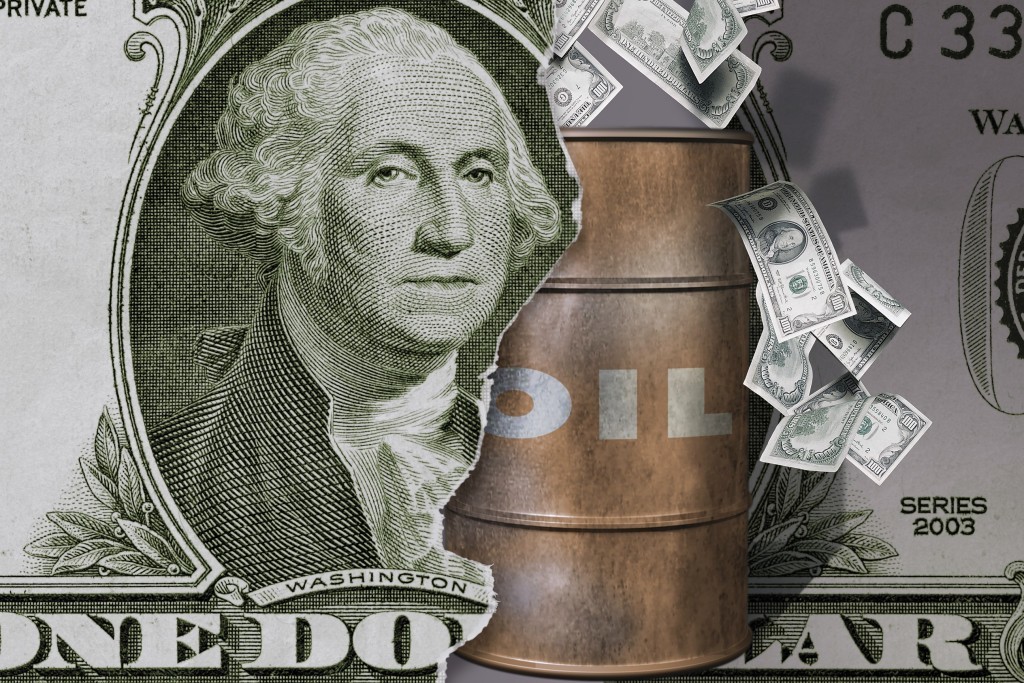
Oil fell below $74 a barrel after U.S. President Donald Trump raised the stakes in the trade war against China with the biggest list yet of goods it may hit with higher tariffs.
Futures in New York fell as much as 1.3 percent after the Trump administration unveiled a list of $200 billion in Chinese goods that could face 10 percent tariffs after public consultations end on Aug. 30. Other risk assets also dropped, with Asian stocks and U.S. equity futures slumping, while safe-haven securities such as the yen and Treasuries rose.
Oil has been trading near a three-year high as concerns of a supply crunch due to disruptions from Libya to Venezuela and renewed U.S. sanctions on Iran overshadowed a pledge by OPEC and its allies to boost production. Though signs of shrinking U.S. stockpiles and output reductions in Norway and Gabon are adding to risks, the intensifying trade conflict between the U.S. and China is heightening fears over global economic growth.
“The trade conflict could eventually weaken the two countries’ economies and, in particular, decrease China’s crude demand,” Makiko Tsugata, senior commodity analyst at Mizuho Securities Co., said by phone. “It’s not only the U.S. and China. The impact could spread to many other countries,” lowering global crude consumption, she said.
Prices Slide
West Texas Intermediate crude for August delivery slid as much as 94 cents to $73.17 a barrel on the New York Mercantile Exchange and traded at $73.83 by 3:47 p.m. in Tokyo. The contract climbed 26 cents to $74.11 on Tuesday. Total volume traded was about 33 percent above the 100-day average.
Brent for September settlement fell as much as $1.26, or 1.6 percent, to $77.60 a barrel on the London-based ICE Futures Europe exchange. The contract climbed 79 cents to $78.86 on Tuesday. The global benchmark traded at a $6.07 premium to WTI for the same month.
Futures for September delivery rose 0.4 percent to 506.9 yuan a barrel on the Shanghai International Energy Exchange. The contract climbed 1.5 percent on Tuesday.
If the proposed $200 billion in tariffs go into effect, duties implemented by the administration aimed squarely at China will cover nearly half of all U.S. imports from the Asian nation. As well as consumer items including clothing, television components and refrigerators, the list of goods targeted by the White House also includes petroleum products such as motor fuels, kerosene and naphtha.
Sanctions Wavers
Meanwhile, America signaled it’ll take softer approach to buyers of Iranian crude. It’s likely that some countries will seek an exemption from sanctions on Iranian oil purchases, and the U.S. will consider these applications, Secretary of State Mike Pompeo said. In June, the State Department had said it’s pressing allies to end all crude imports by Nov. 4 and won’t offer any extensions or waivers to that timeline.
Still, there are already signs the threat of the renewed U.S. sanctions are discouraging some Asian countries from buying Iranian crude. September-loading cargoes are set to be the last to head for Japan if the Asian nation doesn’t receive an exemption from the U.S., people with knowledge of the matter said. The restrictions could remove 1 million barrels a day or more of Iranian exports from the market, according to Standard Chartered Plc.
Supply risks look to be worsening, with a strike curtailing oil production off Norway for the first time in six years. Royal Dutch Shell Plc shut a North Sea field and workers threatened to escalate labor action at the weekend. In Gabon on the west coast of central Africa, output was halted at several Total SA sites after a strike started on Monday. In Venezuela, the oil rig count declined for the sixth straight month to a 15-year low.
Other oil-market news:
U.S. crude stockpiles slid 6.8 million barrels last week and those at the key storage hub in Cushing, Oklahoma, fell by 1.93 million barrels, the American Petroleum Institute was said to report. The U.S. government sees oil production further climbing next year despite transportation logjams in the country’s most prolific shale play. The deepening trade war between the U.S. and China hit commodities markets hard amid growing fears that demand is at risk from a slowdown in global growth.